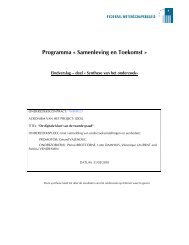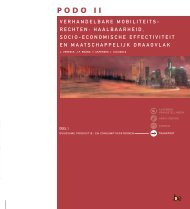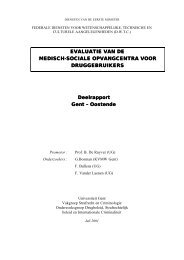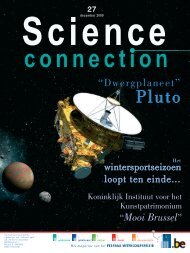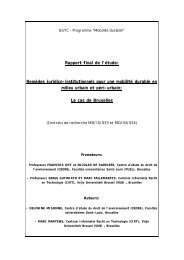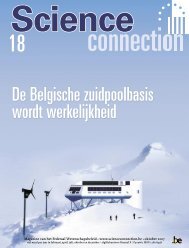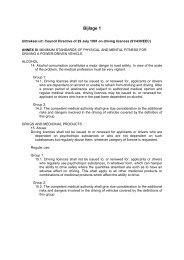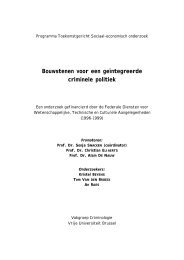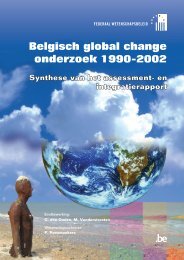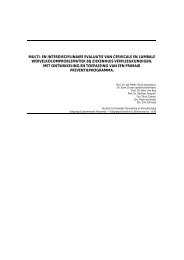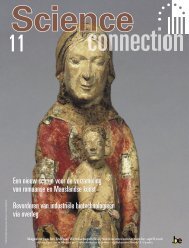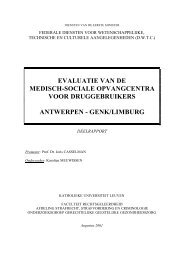chapter 3 inventory of local food systems
chapter 3 inventory of local food systems
chapter 3 inventory of local food systems
Create successful ePaper yourself
Turn your PDF publications into a flip-book with our unique Google optimized e-Paper software.
Project CP/59 - “Instruments and institutions to develop <strong>local</strong> <strong>food</strong> <strong>systems</strong>”<br />
CHAPTER 5<br />
SYNTHESIS AND DISSEMINATION<br />
5.1. Introduction<br />
For the dissemination <strong>of</strong> our results we used the following means: (1) a website with a<br />
description <strong>of</strong> the project and contact details (www.lokaalvoedsel.be), (2) a workshop at<br />
the end <strong>of</strong> the project (The Sustainability Cafe), (3) scientific publications and<br />
presentations, and (4) a toolkit with recommendations for various actors. The toolkit is<br />
developed in collaboration with the European project SUS-CHAIN and is not part <strong>of</strong> this<br />
final report.<br />
5.2. The Sustainability Cafe<br />
5.2.1. Aim<br />
A joint workshop was organised in December 2005 at the yearly national agricultural<br />
fair (Agribex) in Brussels in collaboration with the Department <strong>of</strong> Agricultural Economics<br />
<strong>of</strong> the University <strong>of</strong> Ghent, that works together with Vredeseilanden on a European<br />
project on sustainable alternatives within the <strong>food</strong> chain (SUS-CHAIN). The aim <strong>of</strong> this<br />
workshop was to organise a dialogue and to use the knowledge and expertise <strong>of</strong> the<br />
participants. Using an interactive way <strong>of</strong> working, we not only wanted to validate our<br />
results and recommendations, but also to co-create recommendations with the<br />
stakeholders, such that they are disseminated more swiftly. In total, about 60<br />
participants from a variety <strong>of</strong> backgrounds (academics, government, farmers<br />
organisations, intermediary organisations, individual farmers, NGOs, etc.) actively<br />
engaged in the workshop.<br />
5.2.2. The Sustainability Café: an invitation for dialogue<br />
The ‘World Café’ (Brown and Isaacs, 2005) starts from the assumption that people have<br />
the wisdom and creativity to tackle the most difficult challenges. Given the correct<br />
context and focus it is possible to access this deeper knowledge about what is important.<br />
Participants are sitting at tables in groups <strong>of</strong> four or five in an informal café atmosphere<br />
(with c<strong>of</strong>fee and biscuits freely available). A dialogue is held at each table concerning a<br />
central theme (by means <strong>of</strong> a centrally posed question), thoughts and findings are noted<br />
on the table cloth, grouped and structured. The input <strong>of</strong> each participant is meant as<br />
complementary: the aim is to listen rather than discuss. After 20-25 minutes the<br />
participants are invited to change tables. At each table one person remains as host for<br />
the newly arrived. The hosts summarizes what was said in the previous group using the<br />
notes and drawings on the table cloth, such that these can be used for the next dialogue.<br />
SPSD II - Part I - Sustainable production and consumption patterns - Agro-Food 71



